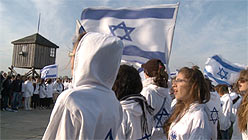It’s easy to play the provocateur. But the willingness to court controversy — to be a rebel with a cause — requires courage. That’s a quality the San Francisco Jewish Film Festival has always had in abundance.
Identity film festivals actively seek out images beyond mainstream movie and television strictures, yet typically gravitate toward positive portrayals. The SFJFF takes a more aggressive and risky approach, inspired in part by the Bay Area’s rep as a fount of political discourse and activism. The other key determinant is that American Jews have been fully integrated into the economic, political, cultural and social systems since the 1950s. Unlike, say, African-Americans and gays and lesbians, Jews no longer consider themselves outsiders victimized every day by discrimination, and have little need for affirmation. Self-examination, however, is a different kettle of gefilte fish.
Which brings us to Yoav Shamir’s discomfiting conversation-starter, Defamation. The young-but-prominent Israeli documentary maker ostensibly set out to learn about anti-Semitism from career opponents such as Abe Foxman, the national director of the New York-based Anti-Defamation League. Shamir’s agenda, in fact, is to question whether it is a good thing for Jews (in Israel as well as the U.S.) to be raised and/or trained to see the world as a bastion of enemies.
Shamir undercuts any earnestness with droll narration and casual, longer-than-normal, on-the-move interviews, but he’s dead serious under that veneer. He keeps his eye and ear tuned for the throwaway comment that is most revealing, then draws in closer. Defamation will receive a theatrical release in the fall, but it should really be seen at the SFJFF (Shamir is slated to attend the July 26, 2009 screening). There’s no better place to grapple with the $64,000 question, 64 years later: How much should Jewish identity be defined by the Holocaust?




